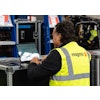
It’s not altogether uncommon to hear about data breaches around consumer brands and electronics, but data security is of special concern to the trucking industry, particularly in light of the widespread implementation of electronic logging devices (ELDs) and increasing shift toward integrations between solutions providers.
As trucking companies have adopted technology and become more connected, the benefits of operating in a more connected ecosystem are abundant, but with these benefits come vulnerabilities, too.
Fleets today share their data with more partners and vendors than ever before. These integrations enable a wide variety of insights, capabilities and efficiencies, but can create problems and gaps in security if not shared safely. That’s why it’s so important for fleets to consistently employ and maintain best practices around data privacy and security.
Common cybersecurity threats
Any type of company that relies on a connection to the internet is susceptible to hacking – a carrier is no exception. The most common risk to a trucking company will likely be the back office, where the majority of sensitive information is stored.
There are, of course, other more nefarious forms of hacking that might involve a physical asset such as a truck or mobile device, but these are less likely to occur, as there may be little or no monetary incentive to a hacker in doing so.
The most common cybersecurity risks that fleets will face include ransomware – malware that locks users out of their system until they pay the hacker -- and phishing, or false emails that may trick a user into sending money or divulging private information such as credit card numbers, social security numbers, etc.
Most hackers are in the game to make a buck – if they’re able to infiltrate a system, they’re most likely going to search for data that can be sold. This may include personnel data, banking information and more, so it’s important to make sure your systems are secure.
In recent years, there have also been some examples of corporate hacking in the trucking and transportation industries, where a company breaks into a system in order to steal the names of a fleet’s drivers, allowing them to more easily recruit them away from their fleet. Or, they may want the names of a carrier’s customers to entice them to switch carriers.
Because trucking companies frequently allow outside companies to access their data for a variety of solutions (such as ELD compliance, visibility, maintenance, etc.), these integrations themselves can sometimes become a vulnerability, potentially allowing hackers to access their data if not properly secured and monitored. That said, there are several ways a fleet can protect itself from potential risk.
Trust no one
One cybersecurity best practice for fleets is to operate using the “Principle of Least Privilege” (PoLP), meaning users are only granted the minimum access to data necessary to complete a task. Rather than inherently trusting others to protect your company’s data, the PoLP helps you control your data and share it sparingly, only as needed.
For third-party vendor integrations, this means being selective about who receives your information, ensuring you’re not sharing more data than is necessary, and that you are able to revoke access as soon as the task is complete. This way, you’re never over-sharing information for long periods of time with vendors who may not have the same rigorous cybersecurity standards in place.
Vetting potential partners
Because fleets often rely on a wide variety of hardware and software solutions or integrations, it’s of utmost importance to carefully select reputable third-party vendors that will be interacting with your data.
When you bring a new partner on board, be sure to find out how they’re using your data, as well as what their own cybersecurity practices are. Set clear terms with integration partners about the length of your engagement and what data you will share with them.
A few questions about cybersecurity to ask a potential vendor include:
· What are the practices you have in place to protect your customers’ data?
· Who is in charge of setting and maintaining your cybersecurity policies?
· Is my fleet’s data being shared with outside sources? If so, how, and why?
· Do you have any third-party security certifications, or have you completed any compliance audits, such as System and Organization Controls (SOC)?
If the vendor seems evasive, doesn’t provide a clear answer or seems lax with its cybersecurity practices, pay attention to these red flags and consider vetting a different provider instead, whose protocols are more robust and transparent.
Updates are crucial
As the value and amount of data in the trucking industry has increased, so has the importance of keeping that data safe. You can’t just implement a cybersecurity policy once and expect your data to be protected indefinitely. It’s key to continue revisiting your policies, regularly review who has access to your data, and update your procedures according to current best practices.
Being careful about how you share your data is essential to the long-term success of your company, so spending more time implementing best practices and vetting partners at the beginning of your relationship is well worth it in the long run.


















